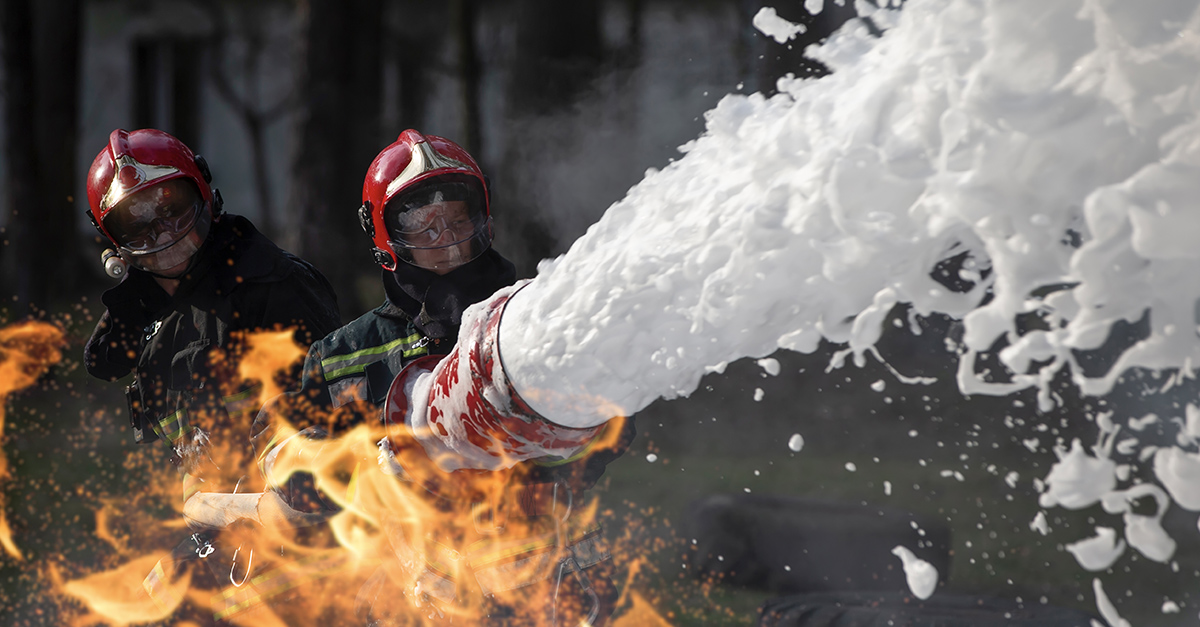U.S. veterans put their lives on the line to protect our country. However, the tragic fact is that military firefighters and other veterans risked exposure to toxic substances like asbestos and firefighting foam while serving.
January is Firefighter Cancer Awareness Month, and the Mesothelioma Veterans Center is joining the efforts by shedding light on the toxins military and civilian firefighters faced.
Firefighters are two times more likely to develop mesothelioma, an asbestos-caused cancer, according to the National Institute for Occupational Safety and Health. Additionally, veterans make up 33% of all mesothelioma cases.
Another toxic substance was aqueous film-forming foam (AFFF), which contains cancer-causing perfluoroalkyl and polyfluoroalkyl substances (PFAS).
U.S. veterans never deserved to develop cancer from simply serving their country. Thankfully, help is available for veterans to get the benefits and compensation they deserve.
Contact us now if you were exposed to asbestos or AFFF while serving and now have cancer. You may qualify for financial compensation.
Asbestos Exposure and Mesothelioma Risks in Veterans
Between the 1930s and early 1980s, the U.S. military greatly relied on asbestos. A mandate required all U.S. Navy ships to use this material. Many bases, buildings, vehicles, and equipment also contained asbestos.
Manufacturers of asbestos products knew the dangers as early as the 1930s but hid them to keep business booming. Today, asbestos is the only known cause of mesothelioma.
Besides mesothelioma, asbestos exposure can lead to:
- Asbestosis, a noncancerous but deadly illness
- Lung cancer
- Ovarian cancer
- Other asbestos diseases
Steps were taken to remove asbestos from many military assets in the 1980s, but millions had already been exposed. Military firefighters may still be at risk as older structures sometimes still contain asbestos.
The U.S. Department of Veterans Affairs (VA) offers veterans with mesothelioma free or low-cost medical care, monthly compensation, and many other benefits. We can help you file for or increase your VA benefits now.
AFFF Linked to Cancer in Veterans
The military has used AFFF firefighting foam since the mid-1960s. While AFFF was thought to be safe, it is now linked to cancer and other health issues due to PFAS.
The U.S. Environmental Protection Agency (EPA) notes that PFAS are long-lasting and can build up in the human body over time, leading to cancer.
Exposure to PFAS-containing AFFF can cause:
- Bladder cancer
- Breast cancer
- Leukemia
- Liver cancer
- Lymphoma
- Multiple myeloma
- Pancreatic cancer
- Prostate cancer
- Renal or kidney cancer
- Testicular cancer
- Thyroid cancer and diseases
- Ulcerative colitis
- Uterine or endometrial cancer
"We were told it was soap and water. We sprayed it up and down the flight lines, out of the training grounds. We sprayed kids during fire prevention visits. We didn’t think it was toxic. We thought it was safe.”
– Kevin Ferrara, Former U.S. Air Force Command Deputy Fire Chief
As of 2025, the military is phasing out the use of AFFF as mandated by the National Defense Authorization Act (NDAA), but firefighters already exposed are still at risk of getting cancer.
Those who develop cancer or other illnesses related to AFFF may be eligible for compensation. Our team can help determine what resources you qualify for — contact us today.
Top 4 Questions About Asbestos and Firefighting Foam Risks
Some U.S. veterans have been exposed to both asbestos and firefighting foam and may have questions about the toxins and related illnesses. Get answers to common questions below.
1. Can Firefighting Foam Cause Mesothelioma?
No, firefighting foam won’t lead to mesothelioma. Only asbestos exposure causes mesothelioma in firefighters.
However, firefighters may have been exposed to asbestos and AFFF because fires could send asbestos particles flying into the air. Military fire stations, trucks, and fire suits may have also contained asbestos.
2. Are Firefighting Foam and Asbestos Still Used Today?
AFFF firefighting foam is still used by the U.S. military today, but it’s being phased out due to the health risks.
Asbestos is no longer used by the military, but some older structures may still contain the substance. Firefighters responding to blazes that involve old buildings should use caution.
3. How Do I Know If My Cancer Was Caused by AFFF or Asbestos?
You might not remember exactly how you were exposed to toxic chemicals if you served decades ago — and that’s okay. Our team can help pinpoint when, where, and how you were exposed.
Call (877) 450-8973 now if you need help determining your exposure after being diagnosed with an AFFF or asbestos-related cancer.
4. How Can I Protect Myself From Cancer?
Cancer is the leading cause of mortality among line-of-duty firefighters. Since the cancer risks of AFFF and asbestos were hidden for decades, firefighters should take time during Firefighter Cancer Awareness Month to stay on top of their health.
Key steps firefighters can take to reduce cancer risk include:
- Cleaning firefighting equipment: Firefighters may return to their stations with suits and equipment covered in toxic chemicals. Promptly cleaning off gear can reduce cancer risks.
- Getting tested often: If you were exposed to AFFF or asbestos, get regular screenings. Cancers can form and spread quickly with little to no symptoms. Catching cancers early may mean that more treatments will be available.
- Wearing protective gear: Firefighters should use personal protective equipment (PPE) when responding to fires due to the potential risks of breathing in or swallowing cancer-causing substances like asbestos.
By following these steps, military and civilian firefighters can take more control over their health.
Participating in Firefighter Cancer Awareness Month
Firefighter Cancer Awareness Month offers a lot of ways you can support the brave men and women who risk their lives to put out fires.
You can participate in Firefighter Cancer Awareness Month by:
- Hearing stories of survivors: Survivor stories can help inspire others to keep fighting. The Firefighter Cancer Support Network has a long list of survivor stories available on its website.
- Spreading the word on social media: Use the hashtags #FFCancerMonth, #FightFFCancer, and #DoingItRight to ensure others know about the month.
- Staying informed: The Firefighter Cancer Support Network educates firefighters about cancer risks and how to reduce them. You or a loved one can also speak with your doctor to get a cancer screening.
Taking action this month can go a long way to helping firefighters now facing cancers following asbestos or AFFF exposure.
Help for Veterans With Cancer From Firefighting Foam or Asbestos
U.S. veterans who got sick from asbestos or firefighting foam deserve high-quality medical care and financial compensation.
The Mesothelioma Veterans Center is standing by to assist veterans who have mesothelioma or other asbestos-related diseases. We can also help veterans who got sick after exposure to AFFF.
We can connect veterans to:
- Compensation from asbestos trust funds
- Health care for mesothelioma
- Legal assistance to get financial payouts
- VA benefits
You do not have to face the health impacts of these toxic exposures alone. Contact our team at (877) 450-8973 today.


